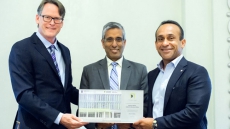Don't know Arabic or fluent English? You'll still get by in the UAE if you know Hindi or Malayalam - a line often repeated in jest here. But mind you, there's a whole lot of truth in that. The UAE is home to 2.6 million Indian expats, the largest expat community constituting 30 percent of the total population!
Little wonder that an overwhelming 48,000 Indians have signed up to see and hear Prime Minister Narendra Modi on Monday at the Dubai Cricket Stadium despite the scorching heat. The excitement is palpable with Modi being the first Indian prime minister to visit this Gulf nation in 34 years - a wish fulfilled after decades of clamour.
Modi's visit primarily seeks to enhance cooperation in energy and trade and reach out to investors. The India-UAE trade totals around $60 billion. This makes the UAE India's third largest trading partner for 2013-14 after China and the US. India is the UAE's second largest trading partner.
But Modi's visit, though on short notice, will also provide much-needed reassurance to Indians in the UAE that the Indian state values their contribution much like their NRI counterparts in the West.

So what sets the Indian community in the UAE apart and in what ways are they important to their home country India and the country they now call their home?
With India being the top receiver of remittances from its worldwide diaspora at $70.4 billion in 2014, Indians living and working in the UAE are the biggest source of remittances to India, contributing $12.6 billion, according to the World Bank. In comparison, about $11.2 billion of remittances for India originated in the US, which has a larger Indian origin population with much higher incomes.
And the contribution of Indians to the UAE growth story too has been immense, whether it is the hard work of thousands of unskilled labourers, those in the service sector or the contribution of Indian businessmen and professionals in fields like health, retail, education or real estate.
Indians emerged as the leading professional migrants to the UAE in 2014, representing 28 percent, according to a global study by professional networking site LinkedIn.

The demographics are interesting. According to the Indian embassy, in the 1970s and 1980s, when the principal requirement was for blue-collar workers, 85-90 percent of them were Indians. In the 1990s, the profile of the community changed. Today, 15-20 percent of Indians are professionally qualified personnel.
Known as the playground of the rich, the UAE is home to six Indians named in the Forbes' 2015 Billionaires List: businessmen Mickey Jagtiani, M.A. Yusuff Ali, real estate tycoon Ravi Pillai, educationist Sunny Varkey, healthcare and foreign exchange czar B.R. Shetty and pioneering healthcare tycoon Azad Moopen.
The UAE has seen a rapid increase in Indian schools and colleges. Earlier, NRIs in the UAE had no choice but to send their children back to India or abroad elsewhere for higher education. It's a different story now with the presence of well known institutes offering graduate and post-graduate courses at campuses in the Dubai International Academic City.
What makes the Indian in the UAE unique from those settled elsewhere in the world is they know they have to go back to India eventually as expats don't get citizenship or permanent residency. So they are Indian at heart and Indian by passport!
At the same time, Indians are top investors in UAE's real estate now. According to a Dubai Land Department report, foreign investment in Dubai's realty market by Indians amounted to AED 18.12 billion (Rs.3,035 crore) in the year gone by, surpassing investments by those from other countries.

Malayalis form nearly 40 percent of the 2.6 million Indians in the UAE, making Kerala the biggest benefactor of the remittances. The country is also home to diverse Indian communities. Sindhis and Gujaratis dominate most family-run businesses. There are also sizeable number of Punjabis, Tamils and Goans.
Where Indians go, they are bound to take their food along. The bustling locality of Karama in the heart of Dubai, nicknamed 'Little India', is dotted with enticing eateries offering menus from nearly 15 Indian states including Karnataka, Maharashtra, Tamil Nadu, Goa and Rajasthan.
For an average Indian, religion is an important part of life. And Dubai shines as a beacon of religious tolerance in the Gulf. In 1958, Sheikh Rashid bin Saeed al Maktoum, father of Dubai's current ruler, permitted a Hindu temple to be built on the first floor of a bylane in Bur Dubai. The over 50,000 Sikhs in the UAE got their own grand Gurdwara in 2012, thanks to land donated by Sheikh Mohamed bin Rashid al Maktoum, the Prime Minister of UAE and Ruler of Dubai. The UAE also hosts several churches frequented by the Malayali Syrian Christians.
The most glamorous business is of course show business. The UAE is a huge source of box office revenue for Bollywood and the Malayalam film industry. Generations of Emiratis grew up watching Hindi movies as staple entertainment, idolizing Amitabh Bachchan and, later, Shah Rukh Khan.

Indian movie stars fly down to the UAE for film premieres a day before it releases even in India! Not to forget the routine store inaugurations and stage shows, one can say that the chances of running into an Indian film star are more in Dubai than in India!



